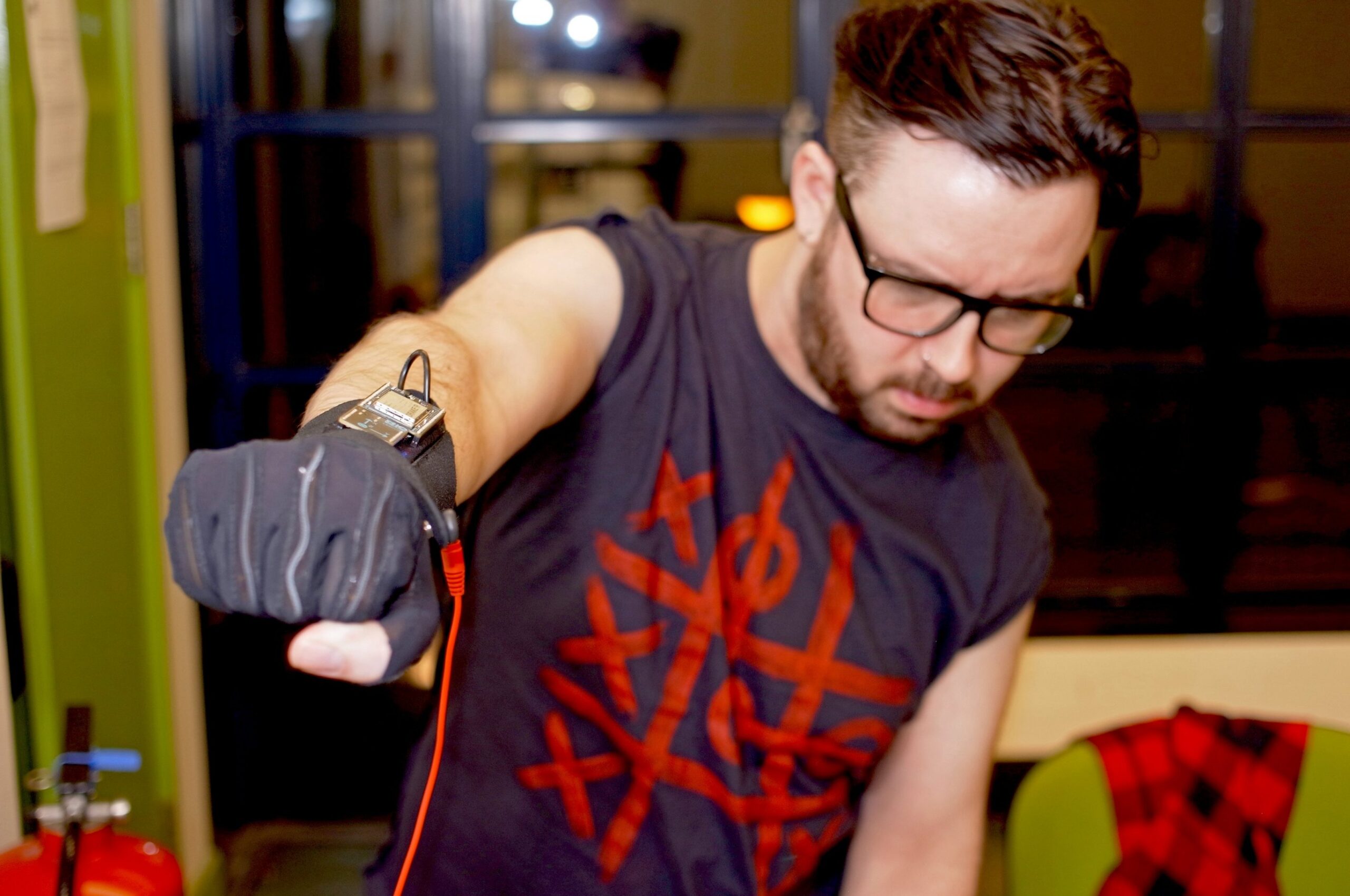
Musician Kris Halpin testing Mi.Mu musical gloves
The right to make music
Carien Meijer describes some recent developments of technology and musical instruments for disabled musicians.
Drake Music is a charity for music, disability and technology, working to break down disabling barriers to music. We use innovative technologies and ideas to open up access to music for all. There are currently many options for a non-disabled person to make a start in music, from playing the recorder to music lessons at school or joining a band. For a disabled musician the options are significantly more limited, and this pattern continues throughout their musical career. For example, a blind music producer will come up against barriers, such as music production technology not working with a screen reader, or a musician facing physically disabled barriers may find conventional instruments inaccessible. We believe that everyone has the right to access and make progress in music-making. We work to open up routes into and through music for people of all ages and abilities. We do this through four programme strands: Learning and Participation, Training and Consultancy, Artistic Development and Research and Development. They interconnect, with learning from one area of work informing the others.
Our artistic development programme champions the inception and production of high-quality art from established and emerging disabled musicians, producers and sound artists. Despite a huge amount of excellent work done by a range of artists and organisations within the arts sector, a negative attitude labelling disability arts as ‘worthy’ rather than ‘high quality’ can still persist in wider society. Within this context we support disabled musicians to experiment, progress, develop their practice and gain more exposure for their work.
Having disabled musicians at the forefront of emerging music technology means that accessibility will be built in as standard
Over the past five years we have initiated over 35 new commissions. For example, we commissioned composer Sonia Allori to create an experimental piece called Seasons 4.0, a collaboration across electro-acoustic music, contemporary dance and interactive technology, supported by us and awarded R&D funding by Unlimited. Sonia has worked with us to develop her professional practice in collaboration with other artists and find ways to contextualise her musical compositions into other types of performance. Seasons 4.0 brought Sonia together with choreographer Sheron Way, dramaturg Danny Braverman and academic technologist Fleeta Siegal. They collaborated online and investigated the idea of using technology to allow the audience to become co-creators of the performance. This experience enabled Sonia to experiment and develop her artistic process and vision through working with other artists and artforms: “In essence the most successful part of this project for me is the creation of this team… It is a very different thing to create music as part of a living, breathing, changing mechanism ignited through the meeting of four minds.”
Our research and development programme investigates and challenges the technology available to disabled musicians. It stimulates and supports the development of new musical instruments and technology, bridging the gap between musicians and hackers, developers and technologists to put accessibility front and centre. One of the ways we do this is through hosting Hackmeets and Hack Days. Our monthly Hackmeets are hosted by musician/performer John Kelly and R&D Manager Gawain Hewitt who collaborate with a small group of technologists, coders and developers. They share work-in-progress and problem-solve to push the boundaries of assistive music technology and create new, affordable solutions. Hack Days are a yearly open-invite event to which everyone who is interested in building accessible musical instruments, technology or apps is welcome to attend. We set a challenge – to create a new type of accessible instrument – and give the hackers 12 to 24 hours to come up with a workable solution. The results of their ingenuity and labour are entered into a competition to win prizes and participants vote for the winner.
Having disabled musicians at the forefront of emerging music technology means that accessibility will be built in as standard and will not get ‘designed out’ as a product moves from prototype to finished article. Hack Days and Hackmeets are a great way to begin addressing issues such as a lack of affordable entry-level accessible instruments or simplistic music tech which does not allow full creative expression for professional artists.
Our work is about opening up the process of music-making to a wide range of people, from delivering a bespoke music workshop in a SEND school to testing and hacking music technology, from training teachers to supporting the development of a world-class music performance. Everyone has the right to make music. Our vision is a world where disabled and non-disabled musicians work together as equals.
Carien Meijer is Chief Executive of Drake Music.
www.drakemusic.org
Join the Discussion
You must be logged in to post a comment.